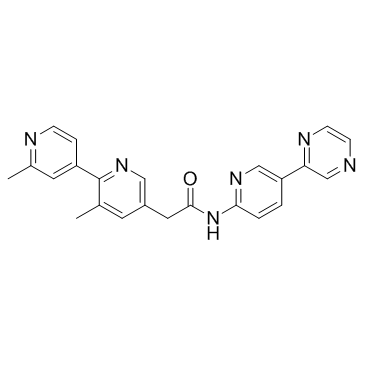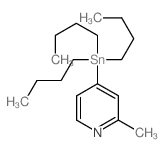| Description |
LGK974 is a potent and specific Porcupine (PORCN) inhibitor with an IC50 of 0.1 nM.
|
| Related Catalog |
|
| Target |
Porcupine[1]
|
| In Vitro |
LGK974 effectively displaces [3H]-GNF-1331 with an IC50 of 1 nM in the PORCN radioligand binding assay. LGK974 potently reduces Wnt-dependent AXIN2 mRNA levels in HN30 cells with an IC50 of 0.3 nM[1].
|
| In Vivo |
LGK974, a drug that targets Porcupine, a Wnt-specific acyltransferase. LGK974 potently inhibits Wnt signaling, has strong efficacy in rodent tumor models, and is well-tolerated. Toxicology studies are performed on nontumor bearing rats at 3 and 20 mg/kg. At the efficacious dose of 3 mg/kg per day for 14 d, LGK974 is well-tolerated without abnormal histopathological findings in Wnt-dependent tissues, including the intestine, stomach, and skin. When rats are administrated a very high dose of 20 mg/kg per day for 14 d, loss of intestinal epithelium is observed, consistent with the concept that Wnt is required for intestinal tissue homeostasis[1].
|
| Kinase Assay |
Radioligand binding assay: using the aforementioned membrane preps, filtration binding assays are performed. To reduce nonspecific binding, 96-well filtration plates are precoated as suggested by the manufacturer with 0.1% BSA and then washed four times with 0.1% BSA. Membrane preps (50 μg total protein) are incubated in polypropylene 96-well plates with 6.6 nM 3H-GNF-1331 in the presence or absence of a testing compound in binding buffer (50 mM Tris, pH 7.5, 5 mM MgCl2, 1 mM EDTA, 0.1% BSA) plus EDTA-free protease inhibitor mixture in a final volume of 150 μL for 3 h at room temperature. Binding reaction mixtures are then transferred to the precoated 96-well filtration plates, filtered, and washed using a 96-pin FilterMate Harvester. Radioactive signals are obtained using a Microplate Scintillation Counter TopCount. Curve fitting is performed using Prism[1].
|
| Cell Assay |
HN30 cells and UMSCC cells are used. For TaqMan assay, 2×106 cells per well are plated into six-well cell culture plates and treated with or without LGK974 in amultipoint dose-response. RNA samples are collected after 48 h. For colony formation assays, 2×103 cells per well are plated into six-well cell culture plates with or without compoundtreatment. Cells are stained with crystal violet 1 wk later[1].
|
| Animal Admin |
Mice and Rats[1] Nude mice (or nude rats) bearing the mouse mammary tumor virus-Wnt1, HN30, or SNU1076 tumors are randomized according to tumor volume. LGK974 is formulated in 10% (vol/vol) citrate buffer (pH 2.8)/90% (vol/vol) citrate buffer (pH 3.0) or 0.5% MC/0.5% Tween 80 and administered by oral gavage at a dosing volume of 10 μL/g animal body weight. Body weight is monitored daily, and tumor sizes are assessed three times per week after the tumors are palpable. Tumor sizes are determined by using caliper measurements. Tumor volumes are calculated with a formula (length×width×height)/2. The plasma concentrations and exposures of LGK974 in the tumor-bearing nude mice (n=2 per dosing group) are determined on day 14. Blood samples (50 μL) are collected by serial retroorbital sampling at 1, 3, 7, 16, and 24 h postdose. The blood samples are centrifuged, and plasma is separated and frozen until analysis by liquid chromatography/MS/MS. For tolerability studies, LGK974 is administrated to nontumor-bearing Wistar rats one time per day by oral gavage at 3 or 20 mg/kg per day. Necropsies are performed at the end of the study. Tissues are fixed in 10% (vol/vol) neutralbuffered formalin, sectioned, and subjected to H&E staining.
|
| References |
[1]. Liu J, et al. Targeting Wnt-driven cancer through the inhibition of Porcupine by LGK974. Proc Natl Acad Sci U S A. 2013 Dec 10;110(50):20224-9. [2]. Tammela T, et al. A Wnt-producing niche drives proliferative potential and progression in lung adenocarcinoma. Nature. 2017 May 18;545(7654):355-359.
|



